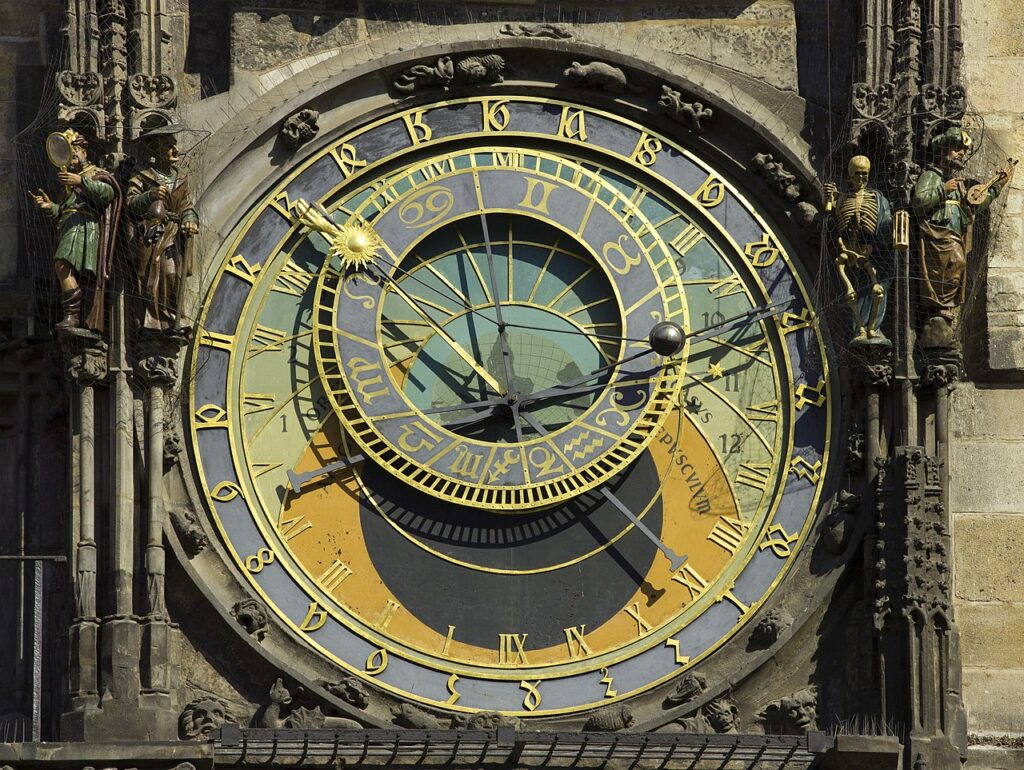The workings of the first church clocks lived in turrets and towers, which loomed over towns and cities to be visible for miles around. The earliest clocks had no dials; rather, they struck the hours on a bell to indicate the time, in order to guide public routines such as worship. The Elizabethan dramatist Thomas Dekker described how the clock bell could be 'heard a farre off, whither we lye in our bed in the night, or in the day time we be far from a Dial'. The word 'clock' itself derives from the Medieval Latin clocca, and French cloche, which both mean 'bell'. In late medieval and early modern Europe, right up until the seventeenth century, time was still a public rather than private matter and was delivered, literally, from on high.
From Rebecca Struthers, Hands of Time 2023
I hate to learn the ebb of time
From yon dull steeple's drowsy chime,
Or mark it as the sunbeams crawl,
Inch after inch, along the wall.
The lark was wont my matins ring,
The sable rook my vespers sing;
These towers, although a king's they be,
Have not a hall of joy for me.
From Walter Scott, 'Lay of the Imprisoned Huntsman' in The Lady of the Lake, set by Schubert as Lied des gefangenen Jägers D 843
The prisoner here contrasts the way that humans measure and mark time (chiming clocks and sundials) with nature’s own rhythms, observed in the behaviour of larks and rooks. For him clocks are a feature of his confinement; time is experienced differently in freedom and in prison. The role of the clock in the poem is to highlight the speaker’s constraints.
So it is with most references to clocks. Striking bells remind us that the time has come. Even if we feel that we are embarked on a journey into freedom, the chimes of midnight interrupt us (as in Gondelfahrer, D 808). Or it may be that the poet’s clock is more old-fashioned – a water or sand clock, where the metaphor is visual rather than aural. The sands of time have run out for us.
Freund, ich bin dein, nicht für den Sand der Zeiten,
Der schnellversiegend Chronos Uhr entfleußt,
Dein für den Riesenstrom heilvoller Ewigkeiten,
Der aus des Ew'gen Urne scheußt.
Friend, I am yours, not just for the sands of time
Which so quickly run out as they flow through Chronos's timepiece,
I am yours for the gigantic river of healthy eternities
Which pour out of the urn of the Eternal One.
Kosegarten, Idens Nachtgesang D 227
Mechanical clocks provided one further metaphor for poets: the wheel of time. Texts based on this circularity tend to stress the promise of renewal and rebirth:
Neu zerstören, neu erschaffen
Treibt das Rad der Weltenuhr,
Kräfte, die am Fels erschlaffen,
Blühen wieder auf der Flur!
As one thing is destroyed another is created,
That is the impulse of the wheel of the world clock;
Powers that lie dormant in the rocks
Blossom again on the grassy surface.
von Schlechta, Auf einen Kirchof D 151
Freude, Freude treibt die Räder
In der großen Weltenuhr.
Blumen lockt sie aus den Keimen,
Sonnen aus dem Firmament,
Sphären rollt sie in den Räumen,
Die des Sehers Rohr nicht kennt.
Joy, joy propels the wheels
In the great world clock.
It lures flowers out of their buds,
The sun out of the firmament,
It rolls spheres in space
Even those unknown to the wands of seers.
Schiller, An die Freude D 189
☙
Descendant of:
OBJECTS TIMETexts with this theme:
- Auf einen Kirchhof, D 151 (Franz von Schlechta)
- Sehnsucht der Liebe, D 180 (Theodor Körner)
- An die Freude, D 189 (Friedrich von Schiller)
- Idens Nachtgesang, D 227 (Ludwig Theobul Kosegarten)
- Der Schatzgräber, D 256 (Johann Wolfgang von Goethe)
- Schwangesang, D 318 (Ludwig Theobul Kosegarten)
- Der Hirt, D 490 (Johann Baptist Mayrhofer)
- An den Tod, D 518 (Christian Friedrich Daniel Schubart)
- Gondelfahrer, D 808, D 809 (Johann Baptist Mayrhofer)
- Wehmut (Die Abendglocke tönet), D 825 (Heinrich Hüttenbrenner)
- Lied des gefangenen Jägers, D 843 (Walter Scott and Philip Adam Storck)
- Zur guten Nacht, D 903 (Friedrich Rochlitz)
- Die Nonne, D 208, D 212 (Ludwig Christoph Heinrich Hölty and Johann Heinrich Voß)


